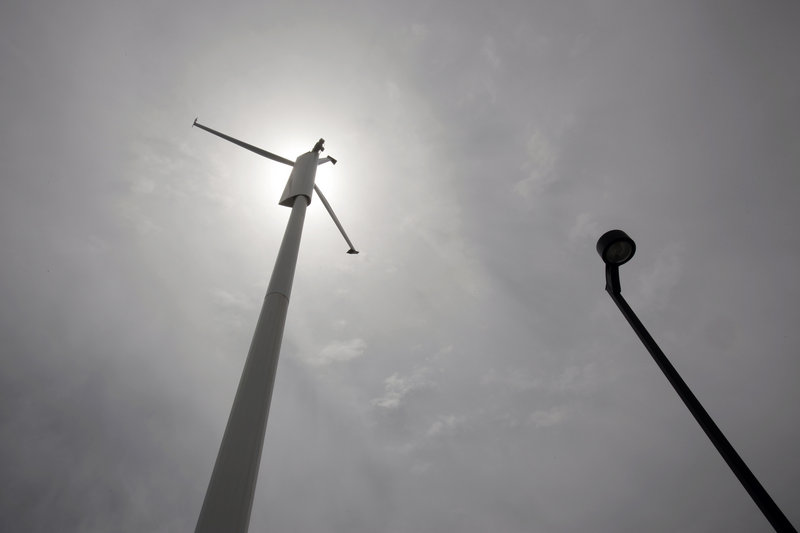PORTLAND – Reading a transcript of the recent LURC hearing on TransCanada’s proposed Kibby No. 2 wind energy project, a 45-megawatt expansion of an existing facility in Chain of Ponds Township, makes you want to cry for Maine’s economy and energy future. And then it makes you mad.
Nearing the end of a review process that began almost a year ago, the transcript makes clear that LURC has no organized procedural approach to final decision making on projects of this type.
There was no staff report on the table summarizing issues, separating more relevant from less relevant issues — no staff recommendation, with supporting documentation that might become the basis for a more focused discussion among the commissioners leading to a final decision.
The commissioners were not even sure if they were merely engaged in a general discussion in which pros and cons might be batted around, or if they were being called upon to decide the question and approve or disapprove the project.
In the end they characterized their action as a straw vote — a vote intended to give the staff and counsel time to pull together a permissible basis for LURC’s decision, which would then be discussed at LURC’s next meeting and presumably ratified.
LACK OF VISION
That decided, commissioners were asked to state the issues that seemed uppermost in their minds and to indicate where they stood on the project. In a nutshell, the vote to deny project approval, a “no,” or “leaning no” vote prevailed, 5-2.
But what amazes this writer is the almost total lack of a larger perspective that the general discussion and remarks of each commissioner reflected. Their focus was on relatively minor intrusions on an existing status quo. Comments ranged from vernal pools to sacrosanct scenic views — potential harms to existing grid system users and to the Bicknell thrush. They were unyielding in their protection of high mountain areas (as if the state owned these land areas), and the proximity of the Arnold Trail became a negative factor.
Little was said of the fact that almost all of these factors could be mitigated in whole or in part.
Little weight was given to the fact that we were talking about a $120 million capital investment, with attendant jobs, tax base and boost to Maine’s economy.
The fact that neighboring communities support the project, or that unemployment in the region exceeds 10 percent, counted for little. No weight was given to the fact that the applicant tailored the project to fit within a legislatively fashioned “expedited permitting area” for such facilities.
It’s as if there had never been a Wind Energy Task Force — recommendations aimed at fomenting a wind energy industry in Maine — legislative passage of state goals for wind energy development or a legislative scaling down of scenic (and related) barriers to wind energy development.
In a larger context there was only the most oblique reference to the fact that our dependence, in Maine and the nation, on ever-more hazardous domestic oil production and the importing of increasing amounts of foreign oil is unsustainable, or that alternative energy production (wind, solar, bio-mass, etc.) is essential today and will be more essential as time passes. LURC acts as if its decision making is totally divorced from these larger realities that stare us in the face.
No mention was made of the ongoing oil debacle along the nation’s Gulf coast. The real or imagined environmental harm that Kibby No. 2 would give rise to pales along side of the actual harm (environmental and economic) being experienced in a five state area of our nation.
FOCUS TOO NARROW
LURC commissioners act as if these realities need not concern them. One speaker suggested that since any steps taken to reduce global warming or our carbon footprint would not produce tangible benefits to Maine — any benefit would be exported by grid-system linkages to others — it would be better to focus on our own high mountain areas, pristine views, vernal pools, etc.
We suffer from this myopic perspective. LURC (and many of Maine’s leading environmental groups who testified against this project) act as if we are an island in the energy/environmental world, but we all know that this is untrue, that this view demeans us — that we need to be part of a solution, not part of the problem.
And finally, the father or mother of a son or daughter injured or killed halfway around the world, protecting a foreign oil dependency, is justifiably outraged by the LURC bottom line that protecting a view, a trail, a vernal pool — blocking a model wind energy development (a small step in ending this oil dependency) counted for more than their son or daughter.
In sum, we need a more careful, a more timely decision-making process, and larger thinking on the part of LURC — and we need it now.
– Special to the Telegram
Send questions/comments to the editors.



Success. Please wait for the page to reload. If the page does not reload within 5 seconds, please refresh the page.
Enter your email and password to access comments.
Hi, to comment on stories you must . This profile is in addition to your subscription and website login.
Already have a commenting profile? .
Invalid username/password.
Please check your email to confirm and complete your registration.
Only subscribers are eligible to post comments. Please subscribe or login first for digital access. Here’s why.
Use the form below to reset your password. When you've submitted your account email, we will send an email with a reset code.